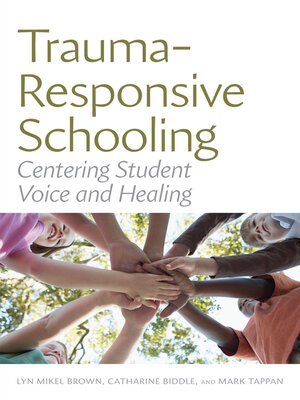
Sign up to save your library
With an OverDrive account, you can save your favorite libraries for at-a-glance information about availability. Find out more about OverDrive accounts.
Find this title in Libby, the library reading app by OverDrive.



Search for a digital library with this title
Title found at these libraries:
| Library Name | Distance |
|---|---|
| Loading... |
Trauma-Responsive Schooling outlines a novel approach to transforming American schools through student-centered, trauma-informed practices.
The book chronicles the use of an innovative educational model, Trauma-Responsive Equitable Education (TREE), as part of a multiyear research project in two elementary schools in rural Maine. In this model, Lyn Mikel Brown, Catharine Biddle, and Mark Tappan endorse whole-school change, encouraging educators to upend traditional classroom power dynamics by listening foremost to student voices, validating student experiences, and promoting student agency.
The authors provide complex real-life examples of student involvement in the creation and implementation of trauma-responsive and equitable practices. Their work offers readers concrete, actionable examples of such practices, which include supporting the whole child by promoting social and emotional learning (SEL) as well as academic achievement; providing access to basic needs such as food, clothing, and health care; and meeting the instructional requirements of dual-language learners.
Many rural schools in the United States experience low student achievement and high absenteeism rates as their geographically isolated communities struggle with poverty, substance abuse, and other significant stressors. Yet, as the authors demonstrate, supportive learning environments, even in under-resourced rural schools, are able to mitigate adversity, stress, and trauma—and thus promote healing.
This heartening work illustrates that, when educators and school leaders put student needs and interests at the core of school life, long-lasting change for all students is possible.
The book chronicles the use of an innovative educational model, Trauma-Responsive Equitable Education (TREE), as part of a multiyear research project in two elementary schools in rural Maine. In this model, Lyn Mikel Brown, Catharine Biddle, and Mark Tappan endorse whole-school change, encouraging educators to upend traditional classroom power dynamics by listening foremost to student voices, validating student experiences, and promoting student agency.
The authors provide complex real-life examples of student involvement in the creation and implementation of trauma-responsive and equitable practices. Their work offers readers concrete, actionable examples of such practices, which include supporting the whole child by promoting social and emotional learning (SEL) as well as academic achievement; providing access to basic needs such as food, clothing, and health care; and meeting the instructional requirements of dual-language learners.
Many rural schools in the United States experience low student achievement and high absenteeism rates as their geographically isolated communities struggle with poverty, substance abuse, and other significant stressors. Yet, as the authors demonstrate, supportive learning environments, even in under-resourced rural schools, are able to mitigate adversity, stress, and trauma—and thus promote healing.
This heartening work illustrates that, when educators and school leaders put student needs and interests at the core of school life, long-lasting change for all students is possible.







